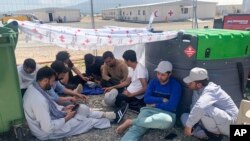A new United Nations-supported survey has concluded that 1.3 million Afghan refugees are residing in neighboring Pakistan, about 100,000 fewer than the figure officially used until now.
An official statement said Friday the government had completed the survey, officially known as the Documentation Renewal and Information Verification Exercise (DRIVE), with the help of the U.N. refugee agency.
Officials explaining the revised figures said that some Afghan families either did not seek to renew refugee status for unknown reasons, or might have simply returned to Afghanistan.
“The data of Afghans was not updated in the last 10 years, therefore it was imperative to verify and update records which will enable us to better understand existing needs in the refugee communities,” said Saleem Khan, the chief commissioner for Afghan refugees in Pakistan.
As part of the verification exercise, documenters gave so-called smart identity cards to close to one million Afghans. Officials said the cards, which are valid until June 30th of next year, are meant to protect and safeguard the displaced population’s interests as legitimate refugees in Pakistan, enabling them to access humanitarian aid and other benefits.
“They provide proof of identity, entitlement to temporary stay in Pakistan, and freedom of movement. They facilitate access to certain essential services, including education, healthcare, banking, property rental and allied facilities,” explained Noriko Yoshida, UNHCR’s representative to Pakistan.
The survey found that more than half of the 1.3 million registered Afghan refugees reside in the northwestern border province of Khyber Pakhtunkhwa.
The DRIVE exercise found that more than half (52%) of the registered refugee population are children, including 197,428 (15%) being four years of age or under. Only 4% of those registered are 60 years of age or older. Women, children and older people represent 76% of the population, according to the statement.
The exercise also allowed for the registration of some 267,000 newborn children of registered Afghan refugees, describing it as an important step for the protection of the youngest members of the refugee community.
The survey, officials said, would facilitate support for those refugees who decide to return home when conditions in Afghanistan allow. The smart cards, meanwhile, allow Afghans to open accounts in Pakistani banks and receive remittances from relatives working in Persian Gulf and Western countries to meet their economic needs.
The Afghan refugees in Pakistan are among several million people who fled decades of conflict and persecution in Afghanistan, starting with the Soviet Union’s invasion of the country in 1979.
Many returned to Afghanistan soon after the United States-led Western military alliance invaded Afghanistan in October 2001 and dislodged the country’s repressive Taliban rulers.
The fundamentalist Islamist group regained power last August just before the final U.S.-led foreign troops chaotically withdrew from the county, prompting hundreds of thousands of Afghans to flee for fear of Taliban reprisals.
Pakistani officials report more than 300,000 Afghans have entered Pakistan since the Taliban takeover. Around 100,000 of them arrived on valid visas while the rest crossed over the border illegally.
Islamabad refuses to treat these Afghans as refugees and wants them to leave Pakistan, saying the country already hosts one of world’s largest and oldest refugee populations and its troubled economy cannot sustain the pressure of new refugees.
The U.N. has repeatedly warned that humanitarian conditions have worsened in Afghanistan since the Taliban takeover and financial sanctions on Kabul have pushed the country’s war-hit national economy to the brink of collapse.






